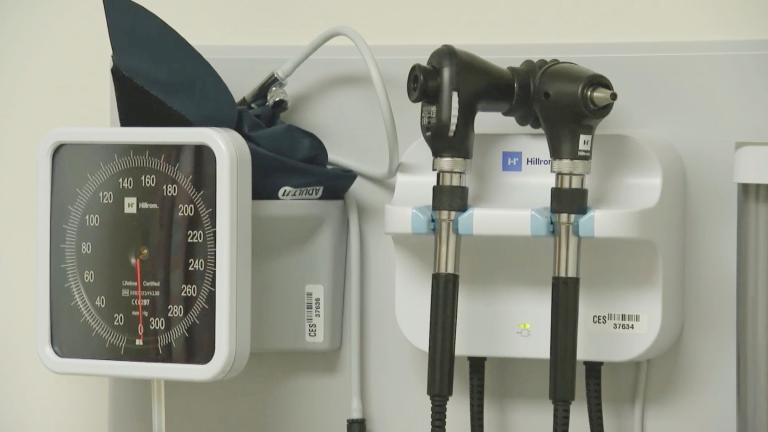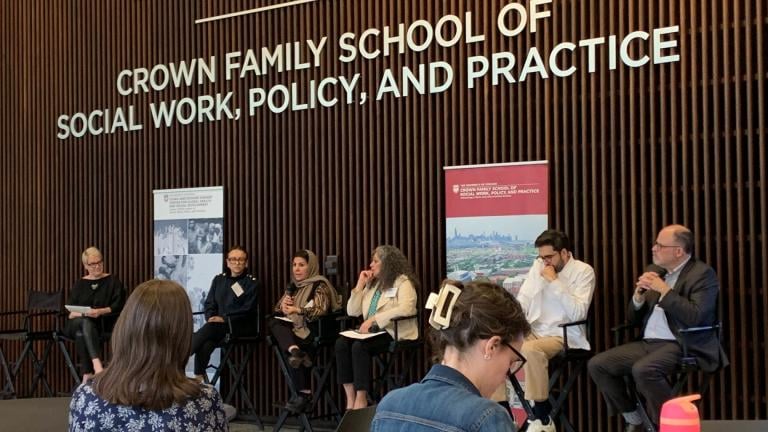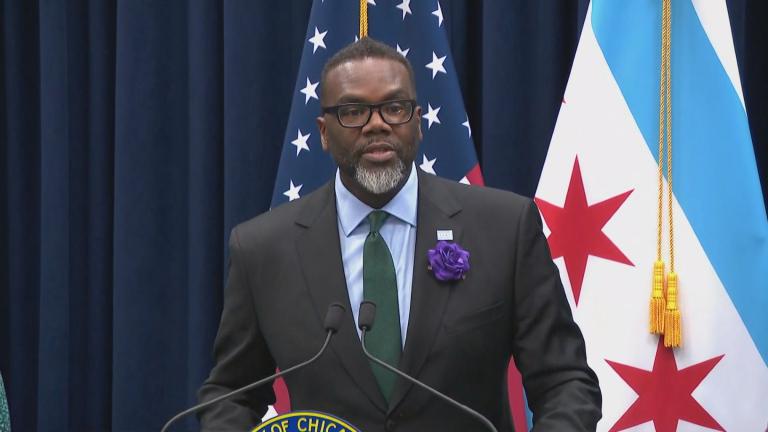The state’s most powerful Democrats marked the first anniversary of the arrival of the first bus of migrants sent to Chicago by Texas Gov. Greg Abbott after crossing the southern border by pressing President Joe Biden to allow the migrants to work in industries facing labor shortages.
Since that first bus of 75 migrants arrived at Union Station late on a Wednesday night with no advance notice, more than 13,500 people have made their way to Chicago, straining the city’s social safety net and at times exacerbating tension between Chicago’s Black and Latino communities.
With approximately 6,700 people taking up every available spot in 15 city shelters, more than 2,000 men, women and children are being forced to sleep on the floors of police stations across the city and at Chicago O’Hare International Airport, according to city data released by the mayor’s office Wednesday.
Since Aug. 18, the number of migrants living at police stations and O’Hare has increased approximately 60%, according to city data. Many are relying on volunteers and mutual aid groups for everything, including basic necessities.
Chicago is in the midst of a significant acceleration of the humanitarian crisis that began 12 months ago and receded from the media spotlight once the cold weather set in only to reemerge as a full-blown humanitarian crisis in April when the number of migrants arriving in Chicago began to increase. City officials had nowhere for them to stay, forcing them to stay on the floors of police stations across the city.
While officials said they remain committed to welcoming those new Chicagoans with “open arms” and hearts, the city needs help from the federal government, Mayor Brandon Johnson said at a news conference Wednesday organized by the American Business Immigration Coalition Action.
“Let me state this clearly: The city of Chicago cannot go on welcoming new arrivals safely and capably without significant support and immigration policy changes,” Johnson said, one day after he and Gov. J.B. Pritzker sent a letter to U.S. Homeland Security Secretary Alejandro Mayorkas asking for assistance.
Johnson spoke with Mayorkas earlier this week, and he said he is scheduled to speak with him again on Thursday.
Johnson spoke alongside U.S. Sen. Dick Durbin, D-Illinois, the second-highest ranking Democrat in the Senate, as well as U.S. Rep. Jesús “Chuy” Garcia, D- Chicago, and business representatives who said they were desperate to hire more workers and would leap at the chance to hire the migrants, who are all in the country legally after requesting asylum but are not permitted to work without special permission.
More than a month ago, Johnson vowed to move those living at police stations into permanent shelters as quickly as possible. Although Johnson’s administration has opened 10 new shelters since the new mayor took office in mid-May, the number of migrants arriving in Chicago from the southern border on buses outstripped the city’s ability to house them.
There is no indication that Abbott will stop sending migrants to cities like Chicago and New York to embarrass Democratic mayors for Biden, who is running for reelection.
“Since the first bus arrived a year ago, it has become increasingly clear that welcoming new arrivals is not a short-term crisis but a long-term dynamic,” Johnson said.
Both Johnson and Pritzker called on Congress to overhaul the nation’s immigration laws, but acknowledged that those efforts are incredibly unlikely to succeed 15 months before the next presidential election and while Republicans control the U.S. House.
Pritzker also asked the Biden administration to bear more of the cost of feeding, sheltering and providing medical care for the migrants. In the past 12 months, the state has spent $250 million to care for the migrants, while city officials have spent $100 million, the governor said.
Under typical rules, immigrants seeking asylum in America have to wait 150 days after submitting their application to ask officials to allow them to work. That permit cannot be granted until 30 days after they ask for it. However, because of massive backlogs, permits nearly always take much longer to be issued.
In all, state and city officials have received just $38 million in reimbursements from the Biden administration, although it is the federal government’s responsibility to care for those awaiting hearings on their request for asylum, Pritzker said.
“We have the jobs, we have the people, we just need authorization from Washington,” said Pritzker, who has been a major supporter of Biden’s reelection bid and will host the 2024 Democratic National Convention where Biden is set to become his party’s nominee for another term.
Illinois is facing labor shortages in “food processing, clean energy, health care (including in nursing and dentistry), transportation, warehousing and more,” according to the letter Pritzker and Johnson sent to Mayorkas.
Immigrants from Afghanistan, Cuba, Haiti and Ukraine are permitted to work in most cases while awaiting a ruling in their asylum case, and the migrants who ended up in Chicago after traveling from Central America should enjoy the same status, officials said.
Chicago has long protected undocumented immigrants. The city’s status as a so-called sanctuary city dates back to 1985, when former Mayor Harold Washington issued an executive order prohibiting city employees from enforcing federal immigration laws. It became law in 2006, reaffirmed after the 2016 election of former President Donald Trump and expanded in 2021.
Video: The WTTW News Spotlight Politics team discusses the humanitarian crisis and more. (Produced by Paul Caine)
Crisis, Inherited
Although the first bus of migrants rolled into Union Station without advance notice, then-Mayor Lori Lightfoot was there to greet the next bus, which arrived four days later. Holding a hastily scheduled news conference, Lightfoot asked residents to donate supplies and money to care for the migrants and blasted Abbott, and his fellow Republicans, as “un-American.”
“He professes to be a Christian,” Lightfoot said of Abbott. “This is not the Christianity and the teachings of the Bible that I know.”
While the famously combative Lightfoot relished the chance to trade barbs with Abbott in the midst of her ultimately unsuccessful reelection campaign, Johnson has struck a less pugnacious tone.
Johnson has spent much of his first 100 days in office grappling with the daily arrival of dozens of migrants. Since the week he took office in May, 109 buses have arrived in Chicago, accounting for half of all buses sent by Texas to Chicago, according to city data. Between 40 and 50 migrants are on each bus, officials said.
At the same time, the number of migrants who illegally crossed the southern border dropped 42% between May and June, defying warnings that an end to restrictions designed to stop the spread of COVID-19 would cause a significant surge.
The number of migrants arriving in Chicago slowed by late October, even as the city’s shelters remained completely full. That prompted Lightfoot to propose opening a shelter in what was Wadsworth Elementary School, one of 50 Chicago Public Schools closed by former Mayor Rahm Emanuel.
That enraged Ald. Jeanette Taylor (20th Ward), who blasted Lightfoot’s decision to open a shelter in a shuttered school without consulting the community or developing a plan to ensure the safety of everyone in the area. Taylor warned that the Spanish-speaking migrants would be isolated in a Black neighborhood.
Since the shelter opened, Taylor said it has proven to be a nuisance and a magnet for sex trafficking.
At the same time, churches and community groups have mobilized to help the migrants, bringing them everything from food, clothing and medicine to toys for their children and assistance in enrolling in school and getting other services.
Johnson has praised those efforts, calling them an example of the “soul of Chicago.”
Just days before leaving office, Lightfoot declared a state of emergency with 450 migrants living at Chicago Police stations. There are now nearly three and a half times more migrants living there, nearly six months later.
Growing tension between Black and Latino Chicagoans boiled over at a City Council meeting at the end of May, resulting in an intense debate that featured racist abuse. Eventually, the council voted 34-13 to spend $51 million from the city’s 2021 budget surplus to help care for the migrants.
But a long-term solution to the problem has proven elusive, even after Johnson vowed in mid-July to move the 950 people then living at police stations into permanent shelters as quickly as possible during an ongoing probe into whether more than one officer assigned to a West Side police station had sexual contact with at least one of the migrants. Officials have yet to substantiate that complaint or identify a victim.
Despite that, Wednesday marked the first time Johnson and Pritzker put the full force of their offices behind calls to permit the migrants to work, and allow them to earn enough money to pay for permanent housing.
However, Johnson bristled at a question from WTTW News about whether state and city officials should have demanded months ago that federal officials allow migrants to work while waiting for hearings in their asylum cases.
“Chicago and Illinois are working together,” Johnson said. “I’ve been mayor for 107 days.”
Note: This article was published Aug. 30 and updated with video Aug. 31.
Contact Heather Cherone: @HeatherCherone | (773) 569-1863 | [email protected]








